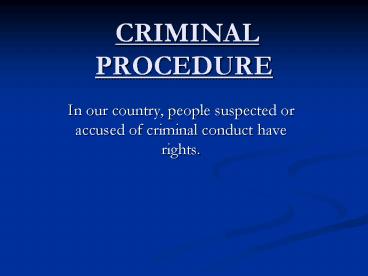CRIMINAL PROCEDURE - PowerPoint PPT Presentation
1 / 8
Title:
CRIMINAL PROCEDURE
Description:
For a person to be convicted of a crime: Evidence must establish guilt with proof ... to the victim to prevent death, serious bodily harm, rape, or kidnapping. ... – PowerPoint PPT presentation
Number of Views:4384
Avg rating:3.0/5.0
Title: CRIMINAL PROCEDURE
1
CRIMINAL PROCEDURE
- In our country, people suspected or accused of
criminal conduct have rights.
2
RIGHTS WHEN ARRESTED
- Persons arrested have the Constitutional right to
due process. - Due process requires
- Fundamental fairness in governmental actions.
- Fair procedures during an investigation and in
court.
3
Rights when arrested (cont)
- For a person to be convicted of a crime
- Evidence must establish guilt with proof beyond a
reasonable doubt. - Constitution gives the right to defendants to
have a jury trial. - The rights of the accused persons are subject to
reasonable limitations.
4
Responsibility for the criminal conduct of others
- Anyone who aids another in a crime is also guilty
of the criminal wrongdoing. - Ex.) If a person is killed during a felony, all
accomplices are guilty of the homicide. - The defendant establishes a defense.
- The defendant must produce the evidence to
support any defense.
5
Two types of defenses
- 1. Procedural defenses are based on problems with
the way evidence is obtained or the way the
accused person is arrested, questioned, tried, or
punished. - 2. Substantive defenses disprove, justify, or
excuse the alleged crime. These defenses try to
discredit the facts that the state sought to
establish.
6
Substantive Defenses
- Self-defense-the use of the force that appears to
be reasonably necessary to the victim to prevent
death, serious bodily harm, rape, or kidnapping.
- Criminal insanity-generally exists when the
accused does not know the difference between
right and wrong. - Immunity-is freedom from prosecution even when
one has committed the crime charged.
7
Substantive Defenses (cont)
- A witness who refuses to testify after the grant
of immunity is in contempt of court. - Contempt of court-is an action that hinders the
administration of justice. It is a crime
punishable by imprisonment.
8
- Punishment-Any penalty by law and imposed by a
court. - The purpose of a punishment is not to remedy the
wrong but rather to discipline the wrongdoer. - Plea bargaining-An accused person may agree to
plead guilty to a less serious crime in exchange
for having a more serious charge dropped.































